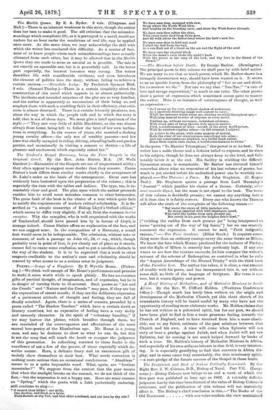The Marble Queen. By E. A. Ryder. 3 vols. (Chapman
and Hall.)—There is an inherent weakness in this story, though the author does her best to make it good. The old criticism that the misunder- standings which complicate life, as it is portrayed in a novel, would not endure for an hour under the conditions of real life, may be applied once more. At the same time, we may acknowledge the skill with which the writer has combated this difficulty. As a matter of fact, none of us know people whom such misunderstandings have actually alienated from each other, but it may be allowed that in the Marble Queen they are made to seem as natural as is possible. The tale is not exactly an agreeable one, but it is powerfully told. In the latter part especially, the interest becomes very strong. The writer describes life with considerable vividness, and even introduces the element of politics into the story, without failing to achieve a certain success.—Stonedale Lodge. By Frederick Spencer Bird. 3 vols. (Samuel Tinsley.)—There is a certain simplicity about the construction of this novel which appeals to us almost pathetically. The incidents and intended surprises of the plot are so very familiar, and the author is apparently so unconscious of their being so, and employs them with such a confiding faith in their efficiency, that criti- cism is almost disarmed. There is a certain leisurely prosiness, too, about the way in which the people talk and in which the story is told, that is not of these days. We must give a brief specimen of the style :—" They saw very little of Adele Blackburn, as she was almost always from home, being left to follow the bent of her own inclina- tions in everything. In the course of years, she married a dashing young cavalry officer—the only son of wealthy parents—and her time was chiefly occupied in riding, driving, attending balls and garden parties, and occasionally in visiting a concert or theatre—a life of pleasure and excitement which especially suited her."


































 Previous page
Previous page